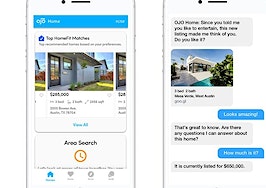We face some unfinished business, but the future of real estate is coming into focus.
Consumer and property data will soon be blended into a dynamic information matrix that will enable new algorithms and create easy-to-use tools for buyers and sellers.
A longtime opaque and one-dimensional process will be busted wide open. It’s important to reveal detailed information on property history, market insight and condition, but we must take another step — interpreting, predicting and weighing the risk and rewards associated with a specific house purchase or sale.
The right house will find you, not the other way around
Gobbledygook? No more than building a complex outpost on Mars.
Imagine a version of the Wirecutter — a popular gadget and appliance review website, that narrows your purchasing decisions down to one or a small handful of items — for houses and the process of buying.
- How much is this house really worth?
- What will its value likely be in five years?
- What is the property’s climate score on disaster risks?
- What is the rental pro-forma if rented on Airbnb?
- How long will the refrigerator last?
- What ambient sounds will I only learn about after sleeping there for a week?
- What are the odds of being mugged, robbed or having my bike stolen nearby?
People will still fall in love with homes
Powerful algorithms will not remove the emotions of buying or owning. But other factors will be a click away and demystify the process, making it faster, more rational and predictable. Buying a house is a big investment. People deserve better ways to know if it is a smart one.
Machine learning will kick in as soon as buyers and sellers actually navigate the process in real time. Their data history, accumulated before and during the act of buying and selling, mixed with property information, will help consumers make smarter decisions as they go.
Consider Amazon and Netflix predicting that you may want to buy the Nighthawk Wi-Fi router or watch the new sci-fi series Osmosis. Imagine similar services for real estate that anticipate your concerns and instantly get you the necessary information to allay your fears — or recommend that you look elsewhere.
Physical sensors and smart-home devices will make many of these tools super powerful to buyers and sellers. Data will identify future costs and liabilities, so the consumer knows what’s coming. Married with the data stored in one’s individual digital identity, a match with the perfect home will happen faster and more seamlessly.
It starts with accessible data that is easy to understand
Take the sticky questions about the health of a condo association, important to anyone buying a condominium or co-op. The history, fees, budgets, reserves and governance rules are all there — and many laws govern associations to protect the consumer — but vital information is often stuck away in file cabinets and institutions. A single paper report is not enough — “check-off-box” disclosures are the worst.
Discovery in the future will be less like Columbus stumbling on the Americas and more like using an app to book a room through Hotel Tonight.
This same opaqueness too often applies to the market value of the home. I sometimes feel like I’m talking to a sorcerer or a psychic, not a market expert, when I ask an agent about housing values. Either they offer vague, upbeat predictions, or they have sealed lips, worried about what to say because of contingent liability associated with forecasting. A good realtor relies on solid market data and lays it out for me to understand.
Then there is the non-dynamic nature of the house’s condition
A physical inspection needs to be conducted, of course, but most of this information already exists. However, it’s hard to get at and requires a lot of hunting, scratching and itching to surface. It reminds me of the old days of journalism before the internet, when I combed through microfiche files to uncover records.
Is all of this an impractical wish list? Not really. Ninety-nine percent of the data is here now. And super-skilled people are building the tools to aggregate the data, engineer the bots, create algorithms and offer new ways of displaying information instantly for all to see.
The secrets of homebuying and selling will soon be over.







